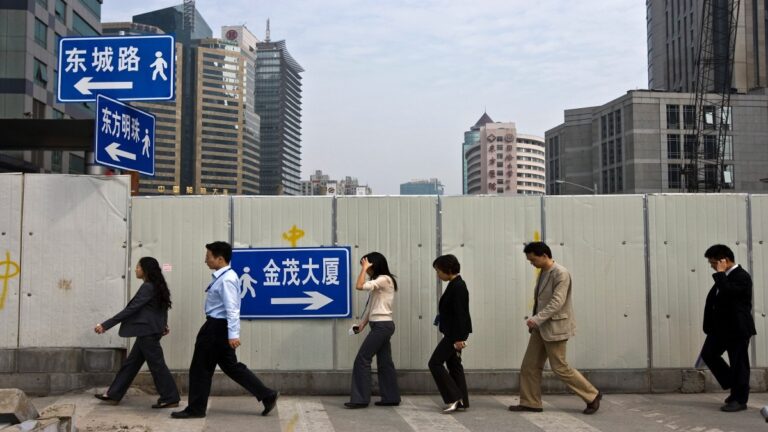Office workers return to their offices after lunch in Pudong, Shanghai’s new financial district. Image/Reuters
The “996” work schedule is the norm in China.
But China’s young professionals are bucking the trend.
In the neighboring country, there is said to be a growing trend of “naked resignation” among young people. Business Insider.
This goes against the traditional norm of working six days a week, from 9am to 9pm, and taking a gap year doesn’t put your career future in question.
Let’s take a closer look.
A growing trend of blatant resignation
“Naked resignation” is a workplace trend in China where professionals quit their jobs without a back-up plan. NDTV.
The trend reflects a growing desire among young people to escape the rigors of corporate life.
It has become hugely popular on social media platforms such as Weibo, the Chinese version of Twitter, and Xiaohongshu.
The expression “LiŎng diŎn yīxiàn” characterizes the never-ending cycle of home and work, capturing the mindset of exhaustion and depletion that inspired the trend, say the authors. Asia Net.
The term also relates to a trend known as “loud quitting”, where people publicly announce on social media that they are quitting their jobs to travel or pursue new interests.
Exhausted young professionals are taking to social media to announce their resignations or departures for trips around the country and abroad.
In a post widely shared on Weibo, the 28-year-old man wrote about resigning from his job after being promoted, and focused on personal goals such as traveling and learning English. NDTV.
Related article: Why young people in China are putting their jobs and bosses up for sale
The impact
This trend aims to free people from endless corporate jobs and redirect their attention to exploring new interests, learning new skills, and traveling.
This trend has been further accelerated by the pandemic and economic downturn, which has led many young professionals to reevaluate their career paths and search for a new purpose in life.
But outright resignation is not without its difficulties.
Challenges include financial uncertainty, difficulties returning to work and gaps in employment history that may raise concerns with potential employers.
While leave of absence is often viewed with skepticism by older generations, outright resignation is becoming increasingly popular among young professionals seeking a more fulfilling life away from the rat race of the profession.
Reduce risk
Before you quit, we recommend taking some proactive steps, such as:
-
Budgeting: Savings can act as a safety net if you lose your job.
-
networking: Networking with industry connections and attending professional events can help you stay in touch and become aware of potential opportunities.
-
Looking for a new role while still employed: This step will minimize employment gaps, ensure continuity of income, and facilitate a smooth transition.
-
Weigh the pros and cons: Making an informed decision requires considering short-term and long-term benefits.
Chinese Work Culture
be
McKinsey Health Institute investigation
China ranked third in employee happiness, scoring 75 percent, in a survey of more than 30,000 workers in 30 countries last year. The survey was done by assessing employees’ physical, mental, social and spiritual well-being. Burnout has become a widespread problem in China as young people are less willing to submit to a demanding work culture.
According to a 2023 survey dtcj.comMore than 90% of employees experience invisible overtime, and of these, 60% experience invisible overtime frequently.
The three most commonly cited habits were replying to work messages after logging out, attending training or competitions organized by the company, and always being available even if no work was assigned to them. More than 73% of people in the survey said they work overtime to keep up with their workload.
Globally, more than 50% of workers are showing signs of burnout and are three times more likely to quit their jobs.
When researchers looked at demographic differences in burnout, they found that workers ages 18 to 24 and non-managerial professionals working for small and medium-sized businesses had higher rates of burnout symptoms.
The findings highlight an important trend: A large portion of the variance in burnout symptoms can be attributed to energy-demanding and aspects of work, such as dealing with harmful behaviors and role ambiguity.
China has long been considering providing legal protections to employees who are forced to stay online after working hours to protect them from such “invisible overtime.”
Information provided by the institution
Find us on YouTube
subscribe

